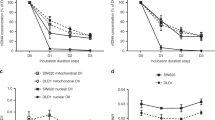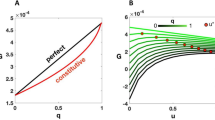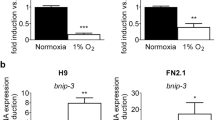Abstract
In the present study we have used flow cytometric DNA measurements on synchronised human NHIK 3025 cells to measure cell cycle progression under various conditions of reduced oxygenation. Our data indicate that addition of 0.1 mM deoxycytidine or uridine has no effect on the oxygen-dependent arrest in late G1 or on the inhibition of cell proliferation through S-phase under extremely hypoxic conditions. Following reoxygenation of cells exposed to extremely hypoxic conditions in G2 initiation of DNA synthesis in the subsequent cell cycle is delayed by several hours. This G2-induced delay is completely abolished for approximately 60% of the cell population by addition of deoxycytidine to hypoxic G2 cells. This finding supports our previous proposal that important steps in the preparation for DNA synthesis occur during G2 of the previous cell cycle, and it indicates that this preparation is connected to the de novo synthesis of pyrimidine deoxynucleotide precursors. The results show that cells are able to enter S-phase in the presence of 100-1,300 p.p.m. (0.01-0.13%) oxygen (here denoted 'moderate hypoxia'), but they are not able to complete DNA synthesis under such conditions. However, the cell cycle inhibition induced under moderate hypoxia is partially reversed in the presence of exogenously added deoxycytidine and uridine, while no such reversal is seen in the presence of purine deoxynucleosides (deoxyadenosine and deoxyguanosine). Thus, both deoxycytidine and uridine could replace reoxygenation under these conditions. These results indicate that the reduction of CDP to dCTP by ribonucleotide reductase, an enzyme which requires oxygen as an essential factor for the formation of tyrosyl radicals for its catalytic activity, does not seem to be the limiting step responsible for the reduced dCTP pool observed under moderate hypoxia. We conclude that the oxygen-dependent catalytic activity of the M2 subunit of ribonucleotide reductase is still intact and functional in NHIK 3025 cells even at oxygen concentration as low as 100 p.p.m. Therefore the cell cycle inhibition observed is probably due to inhibition of the respiratory chain-dependent UMP synthesis at the stage of dihydroorotate dehydrogenase.
This is a preview of subscription content, access via your institution
Access options
Subscribe to this journal
Receive 24 print issues and online access
$259.00 per year
only $10.79 per issue
Buy this article
- Purchase on Springer Link
- Instant access to full article PDF
Prices may be subject to local taxes which are calculated during checkout
Similar content being viewed by others
Author information
Authors and Affiliations
Rights and permissions
About this article
Cite this article
Åmellem, Ø., Löffler, M. & Pettersen, E. Regulation of cell proliferation under extreme and moderate hypoxia: the role of pyrimidine (deoxy)nucleotides. Br J Cancer 70, 857–866 (1994). https://doi.org/10.1038/bjc.1994.411
Issue Date:
DOI: https://doi.org/10.1038/bjc.1994.411
This article is cited by
-
Pharmacological effects of asiatic acid in glioblastoma cells under hypoxia
Molecular and Cellular Biochemistry (2017)
-
Resistance of Rat Bone Marrow Mesenchymal Stromal Precursor Cells to Anoxia In Vitro
Bulletin of Experimental Biology and Medicine (2009)
-
Does the tumor microenvironment influence radiation-induced apoptosis?
Apoptosis (2006)



